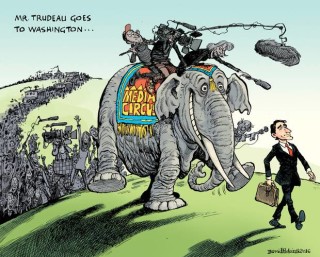Canada has been excluded from a high-level meeting of “significant contributors” to the U.S.-led coalition called to discuss stepping up the fight to defeat Islamic State militants.
The meeting of defence ministers from the United States, Britain, Germany, France, Italy, Australia and the Netherlands is set for Wednesday in Paris.
Defence Minister Harjit Sajjan’s office acknowledged he wasn’t invited to Paris but denied Canada has lost its influence within the coalition.
“It has nothing to do with our CF-18s. It has nothing to do with our contribution,” said Renée Filiatrault, Mr. Sajjan’s director of communications. “[U.S. Defence Secretary Ashton] Carter has already requested a meeting of coalition partners that coincide with NATO on Feb. 11 and we’re focused on that.”
Canadian CF-18 fighter jets are still conducting bombing missions in Iraq and Syria, even as the new Liberal government decides how to honour Prime Minister Justin Trudeau’s election pledge to end the combat mission.
Ms. Filiatrault said the minister has been engaged in regular conversations with his coalition counterparts about Canada’s decision to pull out of the air war and how it can continue to make contributions to the fight against the Islamic State (previously known as ISIL).
However, Conservative defence critic James Bezan said the lack of invitation demonstrates that Canada has been snubbed by the major players who no longer see the country as a valuable ally.
“It is very unfortunate that Canada wasn’t invited,” Mr. Bezan said in an interview with The Globe and Mail. “Because we haven’t been clear on what the next steps will be and we have only been clear that we are going to withdraw the CF-18s, so they see us as a nation in retreat.”
Mr. Carter said the meeting of defence ministers involves the “six nations playing a significant role in both the ground and air components of the counter-ISIL campaign.”
“Each of these nations has a significant stake in completing the destruction of this evil organization, and we must include all of the capabilities they can bring to the field,” Mr. Carter said in a speech last week to the 101st Airborne Division at Fort Campbell, Ky.
A press release from the U.S. Defence Department described the Paris get-together as a meeting of “significant contributors” in the battle to defeat the Islamic State.
Meanwhile, the federal cabinet is reviewing a series of options presented by General Jonathan Vance, Chief of the Defence Staff, to bolster Canada’s role in the coalition once the bombing mission ends. Military sources say the proposals include sending up to 150 special forces personnel to train Kurdishpeshmerga fighters, having Canadian soldiers train Iraqi forces in nearby Jordan and maintaining surveillance and refuelling aircraft.
Canada has 69 special-forces troops training Kurdish soldiers and 600 air-force personnel in Kuwait, where six CF-18s are based along with two surveillance planes and one refuelling tanker.
France’s Defence Minister Jean-Yves Le Drian told BFM TV that the meeting in Paris will focus on refining strategy and tactics to retake cities held by the Islamic State.
The Islamic State, which was ousted by Iraqi forces, backed by coalition air-power, from the western city of Ramadi last month, is being slowly pushed back in other areas.
The main targets now for co-ordinated air, ground and special operations are the city of Mosul in northern Iraq and the Islamic State’s de facto capital of Raqqa in eastern Syria.
“That is going to be one of the most critical sets of operations that happens as part of this conflict and it is going to be significantly larger-scale operations,” said David Perry, defence analyst with Canadian Global Affairs Institute. “What they are discussing and putting on the table, it’s a significant change that Canada is not part of the conversation.”
Mosul could prove to be tough to retake since Islamic State forces have had 18 months to entrench themselves in this city of two million people. They captured it in June, 2014, in a lightning offensive as Iraqi army troops fled in disarray.
“Reaching and retaking Mosul will not be easy, and it will not be quick,” Mr. Carter said. “There will be many engagements in between.”
ROBERT FIFE – OTTAWA BUREAU CHIEF
The Globe and Mail
Published Monday, Jan. 18, 2016 9:43PM EST
Last updated Tuesday, Jan. 19, 2016 6:52AM EST

